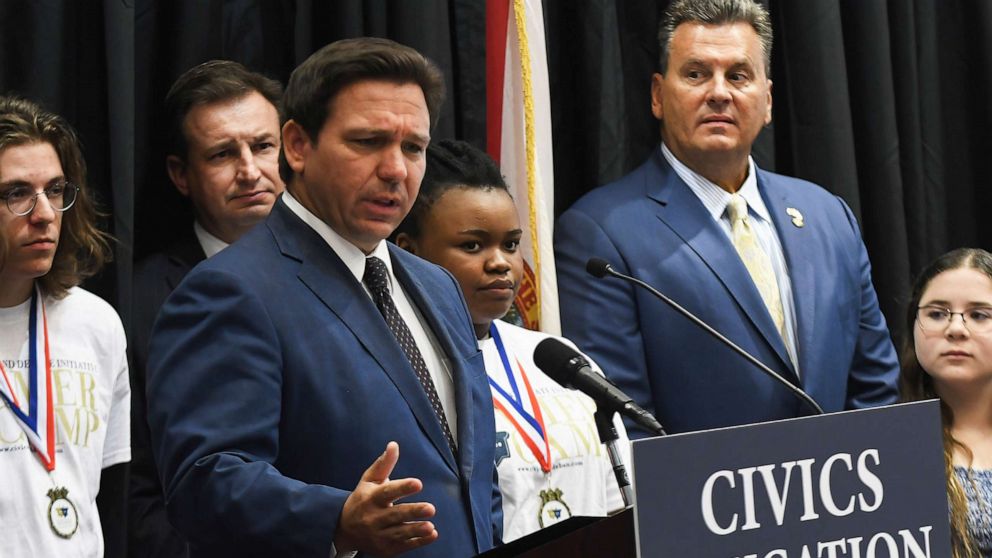它还要求“对共产主义和极权主义等政治意识形态进行比较讨论,这些意识形态与自由和民主的原则相冲突,而自由和民主是美国的建国原则。”
这部法律中的“爱国主义肖像法案”将创建一个精心策划的口述历史资源,其中包括“第一人称叙述其他国家统治哲学的受害者,他们可以将这些哲学与美国的哲学进行比较。"
另一条法律,众议院第233号法案,要求对学院和大学进行“知识自由”和“观点多样性”的审查
与此同时,国家教育部门已经根据所谓的要求修改、删除或拒绝了其他课程“停止唤醒行为”和其他立法。
该法律限制学校中与种族和多样性有关的课程和培训,尽管该法律在法院被阻止影响学院和大学。
这项法律得到了《教育中的父母权利法》的补充,该法限制与性别认同或性取向有关的课程或方案,以及参议院第266号法案,该法案禁止州或联邦资金用于与高等教育中的多样性、公平和包容性或社会行动主义有关的方案或校园活动。
这些限制课堂内容的法律的影响已经显现。德桑蒂斯政府拒绝了一个高级职位非裔美国人历史课程在给ABC新闻的一份声明中,称这“莫名其妙地违反了佛罗里达州的法律,明显缺乏教育价值”。
关于民权运动和黑人历史的课程也被修改了。例如,关于21世纪初黑人社会正义运动的讨论,包括反警察暴行的黑人的命也是命运动,已经从课堂材料。
什么是公民教育?
根据国家教育统计中心的数据,美国的公民教育指的是“民主公民、政府和美国宪政民主”方面的知识和技能。关于美国公民知识的调查通常集中在受访者是否能说出总统候选人、政府部门、宪法的作用等等。
根据2022安嫩伯格公共政策中心的调查显示,不到一半的受访者(47%)能说出政府的所有三个分支。四分之一的受访者表示,他们说不出第一修正案中的任何自由。
超过一半的受访者(51%)错误地认为,根据第一修正案,脸书必须让所有美国人在其平台上自由表达自己。
然而,一些教育家和立法者认为公民教育应该比背诵政府信息发挥更大的作用。
根据倡导公民教育扩展的两党学者联盟CivXNow的说法,他们认为应该教学生如何成为一个积极和有知识的社区成员。
该组织认为,公民教育是关于理解公民话语和公民参与的方法,如抗议、辩论、投票、志愿服务等。
全国教育协会是美国最大的工会,代表公立学校的教师、教授和机构工作人员。该协会认为,公民教育应该包括对当前政治或社会问题的讨论,并促进允许学生将课堂上的课程应用到社区服务中的计划。
Gov. Ron DeSantis' push for 'civics' education: What does it look like?
Florida Gov. Ron DeSantis recently said thatif elected president in 2024he would push for civics education about the founding principles of the United States to celebrate the country's upcoming 250th anniversary.
DeSantis' announcement, which he made during an interviewwith the Washington Examiner, comes amid the yearslong overhaul that DeSantis and state legislators have put Florida’s K-12 education system through, with civics taking center stage.
Florida's America-focused education requirements
DeSantis signed several policies into law in 2021 that set off a wave of new educational requirements about the country and its founding.
One law,House Bill 5, requires implementation of “patriotic programs,” which includes teaching students about accepting “responsibility for preserving and defending the blessings of liberty inherited from prior generations and secured by the United States Constitution.”

Florida Governor Ron DeSantis speaks at a press conference to discuss Florida's civics education initiative of unbiased history teachings at Crooms Academy of Information Technology in Sanford, Fla., on June 30, 2022.
Paul Hennessy/SOPA Images/LightRocket via Getty Images, FILE
It also requires “comparative discussion of political ideologies such as communism and totalitarianism, that conflict with the principles of freedom and democracy essential to the founding principles of the United States.”
The "Portraits in Patriotism Act" within the law would create a curated oral history resource that includes "first-person accounts of victims of other nations' governing philosophies who can compare those philosophies with those of the United States."
undefined
Another law,House Bill 233, requires that colleges and universities be reviewed for “intellectual freedom” and “viewpoint diversity.”
Meanwhile, the state Department of Education has revised, removed or rejected other lessons based on the requirements of the so-called“Stop WOKE Act”and other legislation.
The law restricts lessons and training related to race and diversity in schools, though the law has been blocked in court from impacting colleges and universities.
This law is supplemented by the Parental Rights in Education law, which restricts curriculum or programs related to gender identity or sexual orientation, as well as Senate Bill 266, which bars state or federal funding from being used for programs or campus activities related to diversity, equity and inclusion or social activism in higher education.
The effects of these laws restricting classroom content have already been seen. DeSantis' administration rejected an advanced placementAfrican American history course, saying it is "inexplicably contrary to Florida law and significantly lacks educational value” in a statement to ABC News.
Lessons on the civil rights movement and Black history also have been changed. For example, discussion of Black social justice movements in the 2000s, including the anti-police brutality Black Lives Matter movement, have been removed fromclassroom materials.
What is civics education?
Civics education in the U.S., according to the National Center for Education Statistics, refers to the knowledge and skills in "democratic citizenship, government, and American constitutional democracy." Surveys on American civics knowledge often focus on whether respondents can name presidential candidates, the branches of government, what the Constitution does, and more.
According to the2022Annenberg Public Policy Center survey, less than half of respondents -- 47% -- could name all three branches of government. One in four respondents said they couldn't name any of the First Amendment freedoms.
Over half of respondents -- 51% -- wrongfully believe that Facebook must let all Americans express themselves freely on its platform under the First Amendment.
However, some educators and lawmakers say civics in education should play a larger role than being able to recite information about the government.
They argue it should teach students about how to be an active and knowledgeable member of one's community, according to CivXNow, a bipartisan coalition of academics advocating for civics education expansion.
The group argues that civics education is about an understanding of the methods involved in civil discourse and civil engagement, such as protest, debate, voting, volunteering and more.
The National Education Association -- the nation's largest labor union which represents public school teachers, professors, institution staff members -- argues that civics education should incorporate discussions about current political or social issues, as well as promote programs that allow students to apply lessons from the classroom into community service.





